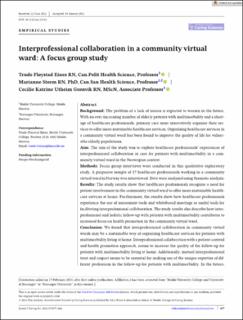Interprofessional collaboration in a community virtual ward: A focus group study
Journal article

Åpne
Permanent lenke
https://hdl.handle.net/11250/3094431Utgivelsesdato
2023Metadata
Vis full innførselSamlinger
Originalversjon
Eines, T. F., Storm, M., & Grønvik, C. K. U. (2023). Interprofessional collaboration in a community virtual ward: A focus group study. Scandinavian Journal of Caring Sciences. https://doi.org/10.1111/scs.13152Sammendrag
Background
The problem of a lack of nurses is expected to worsen in the future. With an ever-increasing number of elderly patients with multimorbidity and a shortage of healthcare professionals, primary care must innovatively organise their services to offer more sustainable healthcare services. Organising healthcare services in a community virtual ward has been found to improve the quality of life for vulnerable elderly populations.
Aim
The aim of the study was to explore healthcare professionals' experiences of interprofessional collaboration in care for patients with multimorbidity in a community virtual ward in the Norwegian context.
Methods
Focus group interviews were conducted in this qualitative exploratory study. A purposive sample of 17 healthcare professionals working in a community virtual ward in Norway was interviewed. Data were analysed using thematic analysis.
Results
The study results show that healthcare professionals recognise a need for patient involvement in the community virtual ward to offer more sustainable healthcare services at home. Furthermore, the results show how healthcare professionals experience the use of assessment tools and whiteboard meetings as useful tools for facilitating interprofessional collaboration. The study results also describe how interprofessional and holistic follow-up with patients with multimorbidity contributes to increased focus on health promotion in the community virtual ward.
Conclusion
We found that interprofessional collaboration in community virtual wards may be a sustainable way of organising healthcare services for patients with multimorbidity living at home. Interprofessional collaboration with a patient-centred and health promotion approach, seems to increase the quality of the follow-up for patients with multimorbidity living at home. Additionally, mutual interprofessional trust and respect seems to be essential for making use of the unique expertise of different professions in the follow-up for patients with multimorbidity. In the future, both the patient's voice and opinion of their next of kin should be considered in the development of more sustainable homecare services.
